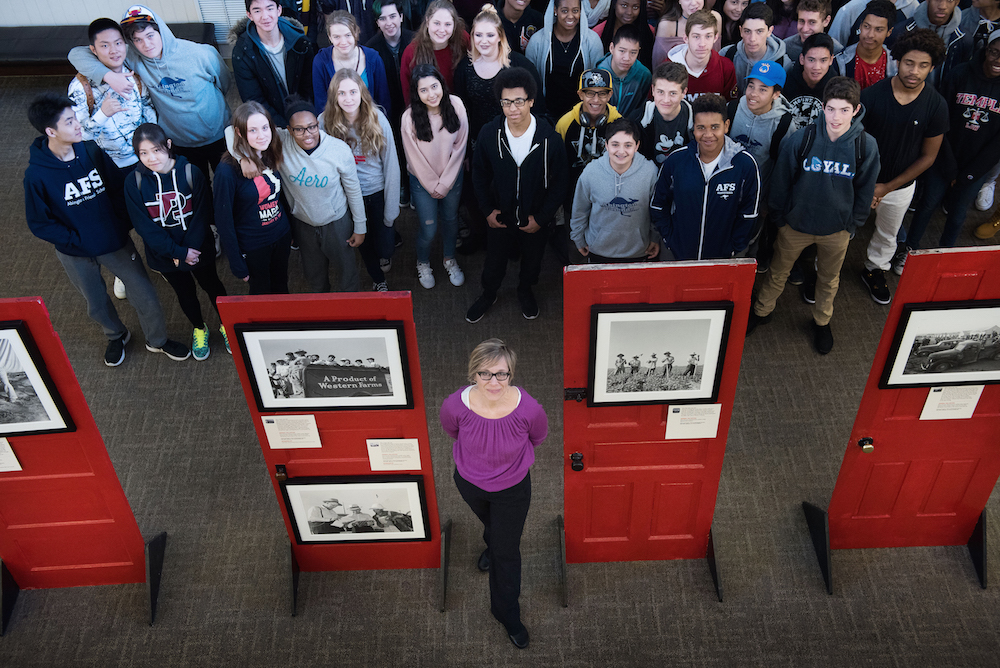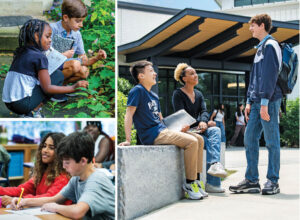By Jenny Burkholder
At age 23, I taught my first class. Thrown into a college Freshman English Composition classroom with a copy of Diane Hacker’s A Writer’s Reference, ideas about the value of writing portfolios, and a grading sheet, which evaluated students’ writing performance with numbers between 1 and 4, I floundered for three years and never asked myself a single question. I never questioned the value of the essays I assigned or the lectures I gave on commas and semicolons. I did not listen to the endless complaints about my grading or my inability to justify comments. I gave up teaching in 1997 after an astute student called me “incompetent” and stormed out of class.
In 2004, after running a literary arts not-for-profit and studying in a year-long intensive MSEd program at Northwestern University, I returned to the classroom and began teaching English at Abington Friends School. What I had learned in those years was that I was not asking myself the tough and difficult questions about my own teaching practice. I was not reflecting on my actions, assuming that what I wanted was right, and what the students wanted was misguided. I was incoherently assessing the students’ work and not being flexible enough to change my ways, and most important, I was not listening to the students or to myself.
Teaching English at Abington Friends School has taught me to be a reflective practitioner. Almost every day, I am engaged in a conversation with fellow teachers about books, students’ learning, or how to be a more compassionate and empathetic listener.
Being a reflective practitioner in the classroom is imperative for a teacher’s success. In my classroom, I must constantly and consistently be reflecting on my practice, asking myself the difficult questions about the value of my lessons, the methods in which I present these lessons, and how well the students are learning. One of my Northwestern professors would ask us to ask ourselves: “Who is this person in front of me? How can I help this person?” To be able to answer these questions, I have to challenge my practice. This is a difficult process to internalize and to live. Questioning oneself and one’s ideas and assumptions takes energy and an ability to admit that you were wrong about an idea, lesson, or preconceived notion. For me, admitting that I might be wrong or biased is very difficult, but by asking myself to challenge many of my assumptions, I have begun to see myself and the students not as fixed, but as evolving characters in the same play.
Thirteen years later, I am still in the process of learning about teaching. Because I have been the teacher who has taken a long time to recognize the strengths of the each student in my classroom, I think I am sensitive to the needs of those whose learning styles are most different than my own. In my lesson plans, I work to incorporate a diverse range of activities, hoping to engage all students’ learning styles. Like any life-long learners, students want to be respected, encouraged, allowed to fail and to succeed, given autonomy and pushed to do their best work, so our job as teachers is to encourage learning conditions that allow for students to shine their Lights.
I’ve found that each of my classrooms is different and has its own characters and dramas. Currently, I teach the whole ninth grade, and each section has its own unique flair, but the essential questions are the same: How is a classroom experience worth a student’s time? How can I arrange conditions that are conducive for reading, writing and discussing? How can I make students feel safe? How do I know if a student is learning and growing? How does my cultural background play into how I teach my students? What assumptions do I bring to the classroom? What assumptions do the students bring to the classroom? These are some of the thorny questions I continue to ask myself as I engage in self-reflection, which for me, means continuing to be vulnerable and open to change.
Teaching at AFS has taught me the valuable lesson of how important it is to be open to being taught. Throughout my career here, I have seen many models of what excellent teaching looks like and in each instance, I have learned from these intelligent, compassionate teachers. I have learned that each person has a perception of the world that has to be honored. I have learned that to be vulnerable and reflective is scary, but will lead me to deeper understanding about myself, others and my teaching. I have learned that when we listen to each other, we open ourselves up to the possibility of change and growth. Now when I look back at my 23-year-old self, I am reminded that she is me, and with my students, we keep on, unfolding like a lotus.


